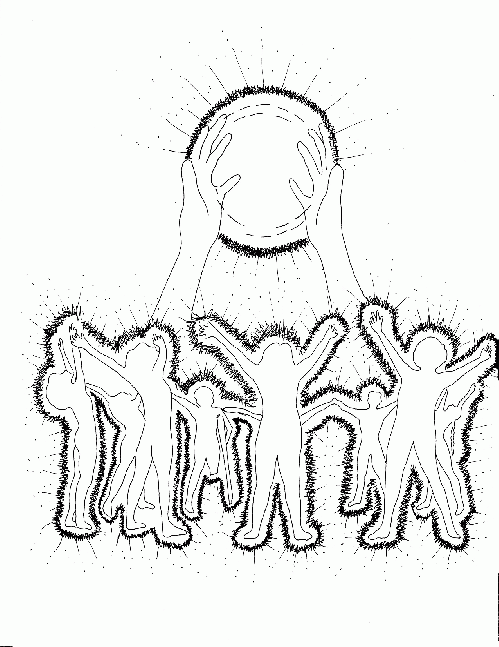Seeking ever more basic answers, today's science is escalating at every level. Biologists think they're chemists. Chemists think they're physicists. Physicists think they're mathematicians, and mathematicians think they're God. Apparently they have forgotten that God is a biologist.
Nineteenth Century technology was driven by an explosion of reductionist science. Plants and animals were conceived as collections of living cells. Diseases were caused by microbes. Chemicals were made of molecules, and molecules were made of atoms. Heat and pressure could be explained as the collective effect of billions of billions of tiny particles bouncing around. Ever more complex machines were constructed of many parts that work together, each with its role--and these machines were changing the way people traveled and the way things were made.
Reductionist science also transformed the Western philosophical outlook at this time. Darwin explained the world of living forms without the need for anything mystical or divine. Nietzsche declared that "God is dead", because all can be explained in terms of universal laws. Schopenhauer despaired the emptiness of moral philosophy in a world where randomness rules and values were unmasked as arbitrary human preferences.
Toward the end of the century, Albert Michelson (it was not Lord Kelvin ) famously declared "it seems probable that most of the grand underlying principles have been firmly established...the future truths of physical science are to be looked for in the sixth place of decimals."
But Twentieth Century physics had something else in store. The reductionist quest toward explanations in the ever smaller world of sub-atomic particles led (in 1925) to a fabulous irony. The mechanicistic laws of Newton were traded in for the Alice-in-Wonderland rules of Quantum Mechanics. Newton's world was
- Perfectly predictable
- Solid and objective
- Built from the ground up with particles as individual components
But Quantum Mechanics was neither objective nor deterministic. The answers you get depend on the questions you ask, and each time an observeration is made, the choice of observation co-creates the reality. The subjective and the objective are inextricably entwined.
Quantum physics is also the polar opposite of reductionism. There is no such thing as an "independent particle"; there are only instances where one can say "I observed an electron", but built into the equations is the ironclad law that you don't know which electron it was. In fact, the fundamental equation of quantum physics (the Schrodinger equation) is not expressed in terms of individual particles but holistic configurations. In Newtonian physics, there are equations about how independent particles move in a force field, but in quantum mechanics there is only one grand equation for the time course of a function that predicts probabilities for every possible way that the Whole Wide World might be configured.
It is a fact little appreciated, even among physicists, that the equations of quantum mechanics are so devilishly intertwined that they cannot be solved even by our largest supercomputers, and so all predictions of quantum physics are based on approximations. We pretend that there are independent particles so we can solve the equations, and when the answers don't come out right, we substitute measured quantities for the computed quantities and put forward a semi-empirical model that sort-of describes crystals or biomolecules or chemical bonds.
Science has pursued the path of objectivity and reductionism to the end, and at the foundation of reality, science has found subjectivity and holism.
This story has two endings, two ways in which science and philosophy are unfolding in the Twenty-first Century.
In the first ending, science and philosophy ignore the holism and the subjectivity that are implicit in quantum mechanics. We cannot wrap our minds around the quantum perspective. So we live with approximations, and we attribute a great deal to "randomness" which might otherwise be explained in terms of teleology, or influence of the whole.
Its science leads to computers and biotech and robotic manufacture and chemical engineering. It finds expression in soulless capitalism, in existential philosophy, in a moral relativism and a "physicalism" that explains away our subjective experience as an epiphenomenon of computation. I am my brain, and my brain is no different in principle from a digital computer. It's the algorithm that counts.
This is the world reflected to us by the institutions of our culture.
But there is also a second ending. Physics has branched into study of chaos and complexity. There is "systems biology" and an inkling that ecology is a frontier richer yet than molecular biology. The holistic sciences have yet to yield grand laws of nature or technological wonders, but that is because scientists have not yet learned to think or to model or to compute holistically. Maybe the quantum computer will change all that.
At the fringes of our culture, there are philosophers and scientists who seek to connect quantum physics with a spiritual world-view. The fact that quantum physics is formulated with an observer playing an essential role suggests that consciousness may be part of the fabric at a fundamental level. Our world was not endowed with arbitrary rules from which life opportunistically emerged; rather it was life's destiny that breathed into the Big Bang and set it in motion. Life is an essentially quantum phenomenon, and an atom of consciousness constitutes the quantum observer inside every cell, whose choices co-determine the evolution of the wave function and the evolution of the biosphere. A marriage of science and mysticism provides a seamless, integrated picture of our cosmos and the life it contains. (It was Schrodinger himself who first articulated this vision .)
This second picture is not yet well-defined, but already it hints at a turning away from the spiritual isolation of capitalism toward a collectivist future. The Second Ending is embraced by a small minority of scientists and philosophers, and even fewer among the non-specialized public. But the second picture integrates deep and pregnant truths, and will seed the transformative changes of the Twenty-first Century.







